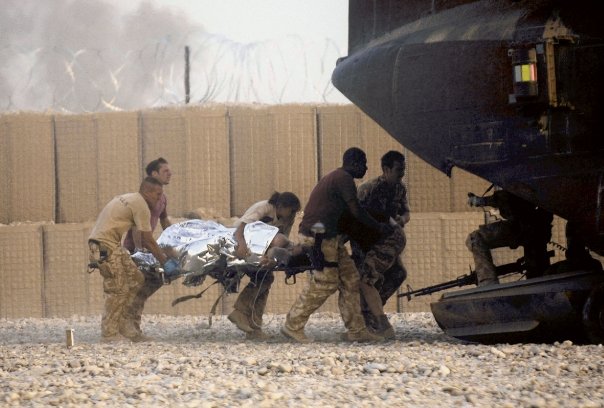Just over five years ago, I was pronounced dead on the front line in Afghanistan. I had collapsed with acute heatstroke in temperatures of 52°C during a military foot patrol. I am a reporter not a soldier, but for four minutes, as a medic attempted to restart my stopped heart, I was a category A. That’s Army speak for ‘goner’.
Six days later, as much to my own surprise as to that of the incredible soldiers who saved my life, I walked out of Selly Oak Hospital in Birmingham on my father’s arm and into the cool of an English late summer’s evening. It was starting to rain. Cars were beeping on a nearby dual carriageway. The smell of cut grass mingled with that of an overflowing bin on which a seagull was solemnly picking at a kebab. I thought it was wonderful.
There in the drizzle, wearing an ill-fitting raincoat over my backless hospital gown, I found myself standing in awe of this most underwhelming of British landscapes. Life after death has changed me — as a reporter, and as a person. The mundane seems suddenly wonderful. I no longer have an interest in going to combat areas, military charities receive a grateful wedge of my monthly salary and I’m less keen on sunbathing.
I am incredibly fortunate. I suffered a cardiac arrest and complete liver and respiratory failure. I spent 18 hours in a coma at a military field hospital before being med-evaced out of the war zone. It is only because of the professionalism of the British Army that I am alive to write these words. While well-meaning people like to inform those of us who have dodged death that we must make the most of our second chance at life — stand for election, start a company, save the world — this seems entirely to miss the point of living.
Dying did not turn me into a devout Catholic, nor did feelings of my own mortality inspire me to cook up methamphetamine to sell on the black market. It doesn’t work that way — for me, or anyone who has cheated death. Take Vesna Vulovic, a Serbian air hostess who was sucked out of a Yugoslav Airlines flight from Stockholm to Belgrade after a terrorist’s bomb tore it in two. She fell 33,000ft but made a full recovery — and started her new life by continuing her old one, going back to work for the airline. Or Roy Sullivan, a park ranger in Virginia who was struck by lightning while on duty. He recovered and then went back to work. He was struck again, and went back to work again. Lightning had hit him seven times before he took his own life, aged 71 — reportedly over unrequited love.
Walk around with a heart inside you that once stopped beating and you feel less of a need to change your life radically. You learn to savour what you have and not yearn, as you once did, for what you don’t have. What once seemed like glittering prizes — a longed-for promotion, a Hogmanay party planned three months in advance, an overpriced Roland Mouret dress — suddenly seem meaningless, opaque.
I can give you an example. Not long after I got home, I went to the fishing village of Crail, tucked away in the East Neuk of Fife. My chest was painful from resuscitation, and I could only sleep sitting upright. It was one of those endless Scottish summer days where the countryside glows with fields of rapeseed and the sky turns a deep, inky blue. I walked down to the harbour and watched a fisherman hauling in his lobster pots. The air was thick with salt. High above, oyster–catchers circled the bay. Had I not died, I might still have seen all of this — but I would have missed it too. I would have missed the spaces in between. This is what living is about; those little moments that sneak by before you even notice them.
There’s a temptation to see your life history as a list of major events — some planned, most not. But when I list the reasons I’m glad to be still alive, I think about the incidental moments. Reading in bed, for example, with fresh sheets and a cup of Earl Grey, and the cat curled over my toes. Sometimes it is the slice of hot toast with butter, eaten standing up in the kitchen after a night out.
And that part of the evening when it’s too late to be sensible and too early for bed and your companion turns to you and asks, ‘Shall we have another bottle?’ These snatches of time are not important, they flash by in a second, but it is within them that real life lies. Their significance is that they have no significance at all.
Death still scares me, but not so much as the fear of not really living. Or realising that the things which make us happiest can also be the easiest. A hot bath after a long day, the noise a new book makes when you crack the spine, Carols from King’s on Christmas Eve.
These are the moments worth living for. The ones worth getting up in the morning to experience. And the ones I will remain grateful for until the day I die. Again.






Comments